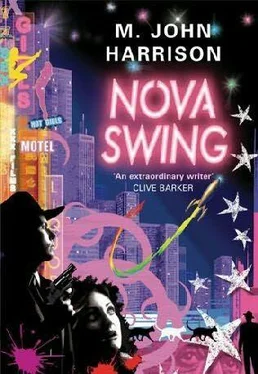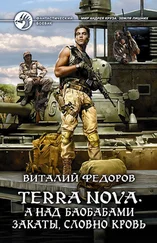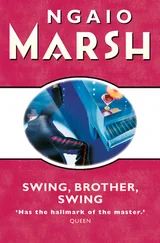At this point Antoyne opened his mouth to confess something. If Liv had let him speak, perhaps that would have changed her mind about the whole deal as Antoyne had put it to her, but she didn't, only went on, "By the way, I dialled up hardware reports too. Jesus, don't even talk about them. Those engines it has? With the power cable, and big flywheels? What kind of physics is that about? Antoyne, don't look like that, I'm teasing you. Anyway, they'll last two, maybe three trips." She finished her drink and said aside to Irene, "Be sure and make him wear his lead pants; the hull's ablated to a wafer."
The Mona, who had been looking out the window and thinking about poor Joe Leone, repeated, "Lead pants," and laughed.
"I'll fix all that," Antoyne said.
"Rather you than me."
If you understand ships like the one Antoyne wanted to buy, you can always make a connexion. You can walk into a bar on Motel Splendido or New Venusport and always see someone you know. They owe you money. They owe you a drink. They owe you an explanation. And it's true that you owe them all or most of those things too; in fact it's the only reason you can do business at all. Perhaps Liv was thinking about this when she nodded judiciously and said:
"At least change the name, Antoyne."
Antoyne took Irene's arm. They smiled at each other. "We plan on that," the Mona said.
Thirty thousand miles above Liv Hula's bar, Paulie DeRaad had recently arrived in the quarantine orbit.
He was not the Paulie they had known. Gone were the sharp nose, the lively blue eyes, the shock of white-blond hair in its signature widow's peak, the fragile radiation-thinned skin which in some lights gave you the illusion you could see right down into the musculature of his face. Like everyone on the ship that brought him in, Paulie was by now more of a notion than a person you could actually describe. Individual voices might still be heard in the human quarters. But while, in a sense, Paulie was still being Paulie-that is, someone who never closed, who still liked and wanted everything-and you had the clear feeling that someone was still genuinely alive in there, you knew it would be hard now to separate Paulie from the members of the vacuum commando that had brought him in. What these connexions-volunteers to a man-said oftenest about Paulie was:
"You fucking fuck, DeRaad. You fucking tourist." Most of the quarantine ships were huge; pocked and used-looking; alive with the dim crawling lights of beacons and particle dogs. Typically you found old pipeliners that had worked the Carling line, obsolete Alcubiere warps the size of planetisimals even with their relativity drivers torn off, anything with a thick strong hull, especially if it was easy to reinforce further. Other things they had in common: they were mined, with high-yield, top-shelf assets from the EMC catalogue; and their hatches were welded tight. No one was sure what kind of atmosphere they now contained, if any. Inside, whatever their age or origin or state of outer preservation, they had only two qualities: pitch dark or light too bright to bear. Hundreds of them, as far as you could see, rolling around forever in gluey braided orbits, drifting together and then apart. Once in six months, complex resonance effects put them on collision courses. Alarms went off. An engine fired for a millisecond or two in the dark. For a day or two afterwards the vacuum between the hulks took on an ionised look, as phase-changes rippled through a smart gas of nanodevices designed to monitor hull thickness, skin temperature, core temperature, and emissions in all regimes including, curiously, soundwaves, generated by so-far undescribed events inside.
How many human beings were stored in the quarantine orbit? How many escapes did they represent?
No one knew.
Any number of smaller vessels could be found drifting between the hulks. They were still volatile. Their trajectories were impossible to map. They were a danger to everything with their fragile contemporary hulls and lively contents. They still had windows and hatches. One of them was the K-ship Poule de Luxe, originally on grey ops out of Radio Bay, but lately seconded to Quarantine.
Poule de Luxe, everyone's favourite survivor of the Nastic Wars, tumbled aimlessly end over end, her armaments extending and retracting meaninglessly, her riding lights off. She had come a long way since exfiltrating Paulie DeRaad from the Saudade Lots. When they understood it was too late to find DeRaad a place in a hygiene facility-too late not just for Paulie but for themselves- the vacuum commando had tried to steal her. To their credit they got halfway across the Halo before her K-captain regained control. It had been a long flight back. There had been some problems. There had been shrieks and screams from the human complement as they realised fully what Paulie had brought them. Now, its mission completed, the mathematics had switched itself off. The K-captain had switched herself off too, in case she could be extracted at a later date. Power was down.
Aft, in the crew quarters, it was cold but not dark. Charred and buckled bulkheads contained the escape, which presented, like the majority of escapes, as a loose, luminous fluid medium sometimes the consistency of rice pudding or lentil soup, sometimes having the visual qualities of a pool full of chlorinated water agitated gently in powerful sunlight; often too bright to look at, and developing intricate internal flows independent of input. If there was code in there, no one knew what it was doing. No one knew how it bound to the substrate of proteins and nanomech. It looked beautiful, but stank like rendered fat. It would absorb you in seconds. Was it an end-state? Was it a new medium? No one knew. The hulks were full of it. No one knew what to do with it. No one knew what it was: except that, in this case, in a previous life, some of it had been a Saudade gangster and some of it had been his friends from EMC. Shock fronts raced through it. Random state changes were precipitated. Every so often a shape assembled itself with difficulty and made its way to the porthole, and a barely audible voice whispered:
"Wow. Fuck. See that? Alcubiere, right off the port bow! See?" Hard to know if the shape was Paulie; if he was able to retain that much of a sense of himself. But perhaps nothing is hopeless, and perhaps he had found a way to enjoy life again. Meanwhile the remainder of the mass boiled resentfully and said: "DeRaad, you cunt."
Edith Bonaventure, in the aftermath of Emil's death, found it hard to know what to do with herself. She worked the port gate and the tourist traps. She visited a new bar every night, after which she went home determined to throw out Emil's things, and couldn't, and couldn't sleep either, and in her state only ended up sitting on the floor as if he was still alive, reading his journals aloud.
"The site," he had written, "behaves just like a child with a secret. No one must know, but everyone has to try and guess."
Edith had other needs than working her father through her life and into his proper place, if ever that turned out to be possible. These needs were less readily defined. They sent her to the fights in the soft early darkness of summer evenings, but at Prefer Coeur the smells of fried food, alcopops and haemoglobin held less goodness than before. (You can claim, and people do, that every fighter is different: but it is a difference, Edith had begun to feel, that works itself out within sameness: so that when you've seen one monster cock you've truly seen them all.) They sent her to stand in the pool of light outside the Uncle Zip and Nueva Cut franchises, but though she wanted to be new, she couldn't believe in newness; though she wanted to travel, she was reluctant to leave. Window shopping Straint Street one early evening, for a cheap deal on a different self, she passed the Black Cat White Cat bar, where she saw the notice in the window and inside found the barkeep standing in the usual trance behind the zinc counter.
Читать дальше












